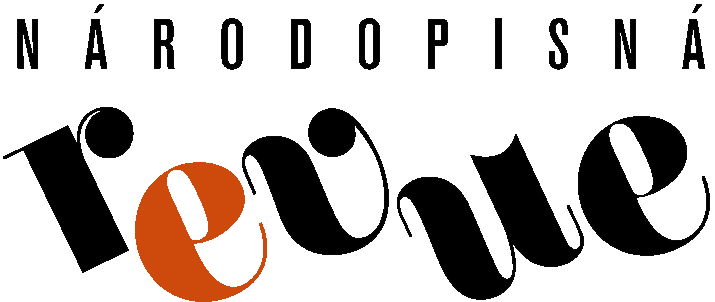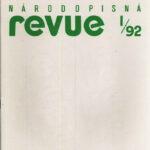This year's volume of Národopisné revue (Ethnographic Review) has a new conception: it is a scientific-popular periodical published both for professionals and amateurs interested in folk culture and in its place in the contemporary cultural trends.
The first issue of the 1992 volume brings a Czech translation of a UNESCO document called "Recommendations on the Protection of Traditional and Folk Culture". Freely connected with these recommendations are the answers of some representatives of the Czech science and culture on a question regarding their personal relation to folk art and traditions (the sociologist M. Petrusek, dramatist F. Pavlíček, choreographer A. Skálová, graphic and plastic artist and educationalist K. Longer, the historian J. Válka, and L. Vaculík, a writer).
The central topic of the issue is folklorism. The introductory study by O. Sirovátka "Folklorism in the Cultural Life of the Society" tries to define the sense proper and deeper significance of the care of folk culture and of building on folk traditions. He holds that folklorism consists in rediscovering the folk art, folk culture and folk lore, in an effort to revive its phenomena and its values for the contemporary man. It is connected with a search for the actual sense and values of folklore and of folk art in the present world. Closely connected with the topic is the article "Hanatics as an Expression of Folklorism" by J. Válka trying to explain the role of folk culture of Haná - the ethnographic region covering central Moravia - as a source of inspiration. His study is based on the assessment of 17th - 19th century records and literature and follows the metamorphoses of social attitudes towards the traditional culture of the rural population, with special view to the Czech national rebirth and romanticism, when manifestations of folk culture were frequently used for the manifestation of national identity and of its ancient roots. Of controversial - eventually polemic character is the article by V. Stanovský "Regionalism, Nationalism and also Cosmopolitism". He emphasizes that the essence of the culture should be seen not only in its peaks, but also in its quantity and regional variety.
The column Errata 4 brings a list of printer's errors in the previous issues of the Národopisné revue, under the title "To Err is Inhuman", paraphrasing the known Latin saying. R. Jeřábek is putting right countless printers' errors in his study "Ethnische und ethnographische Gruppen und Regionen in den böhmischen Ländern (17. - 20. Jahrhundert) in the proceedings Ethnologia Slavica 19, Bratislava 1987. Both the editorial board of the proceedings and Slovenské pedagogické nakladatelství (Publishers of Slovak Educational Literature) refused to publisch the errata, some of them grossly distorting the facts. The author decided to sum up all those errors, and he mentions some of them in the column reserved for the errata occurred in the Czech ethnography.



